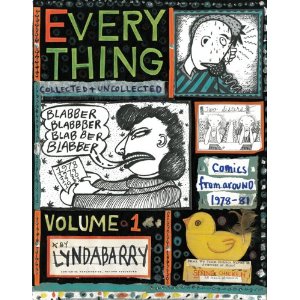 I came late to the Lynda Barry love. I wasn’t cool enough to read her in the alternative weeklies in the eighties and nineties, and it wasn’t until I was a graduate student in English and trying to hide a lifetime of reading comics from my colleagues in the ivory tower that a friend introduced me to One Hundred Demons. Soon after, in a fit of rebelliousness, I began to teach Demons in my “Writing the Memoir” class. Ten years later I have become a kind of addict, consuming all of Barry’s works, and there are a lot of them. Barry writes plays, essays, and novels. She created the ultimate chronicle of childhood experience, Ernie Pook’s Comeek, for over twenty-five years. Lately, Barry has been making do-it-yourself writing and art workbooks, and this month, Drawn & Quarterly will begin re-releasing all of her comics in their original format starting with Blabber Blabber Blabber: Volume 1 of Everything. Get that book. Get all of them.
I came late to the Lynda Barry love. I wasn’t cool enough to read her in the alternative weeklies in the eighties and nineties, and it wasn’t until I was a graduate student in English and trying to hide a lifetime of reading comics from my colleagues in the ivory tower that a friend introduced me to One Hundred Demons. Soon after, in a fit of rebelliousness, I began to teach Demons in my “Writing the Memoir” class. Ten years later I have become a kind of addict, consuming all of Barry’s works, and there are a lot of them. Barry writes plays, essays, and novels. She created the ultimate chronicle of childhood experience, Ernie Pook’s Comeek, for over twenty-five years. Lately, Barry has been making do-it-yourself writing and art workbooks, and this month, Drawn & Quarterly will begin re-releasing all of her comics in their original format starting with Blabber Blabber Blabber: Volume 1 of Everything. Get that book. Get all of them.
Why? Well, the writing, to start. Lynda Barry can write, really write. And despite her frequent protestations (and lamentations about spelling) Barry is witty and articulate. Don’t let the wacky penmanship fool you. Who else could come up with the infamous line, “Love is an exploding cigar we willingly smoke?” Barry also excels at more poignant observations, such as, “We never need certain monsters more than when we are children.” Known as a particularly wordy comic artist, Barry’s expertise with language bears attention with careful reading and subsequent re-readings. Barry’s good friend Matt Groening once commented in a 1991 interview, “Lynda’s stuff is just incredible. It’s about as close to literature as comic strips have ever gotten, and I think she’s really on to something new” (94). Not to quibble with a master, but I think Barry’s oeuvre doesn’t come close to literature, it IS Literature with a capital L—words and works of depth, mastery, and emotion, and my appreciation for her only grows over time.
Barry is certainly known for her text, but then there are the pictures, the somewhat controversial pictures. Can Barry draw? Are the shaky, scruffy characters with their elbowless arms and freckles and blemishes indicative of an inferior artist? Does it matter? (Well, to some I suppose it does matter, so for the record, yes, she can draw…and paint…and sing through her teeth, but I digress. In any case, check out the early Spinal Comics from her college years at Evergreen to see a more representational drawing style.) I would argue that if one is to thoroughly examine Barry’s art across many genres, including painting, drawing, and collage, in addition to the range of styles demonstrated in her various comic art projects, it becomes apparent that the coarse, edgy aesthetic most associated with Barry is a very conscious choice, rather than any artistic weakness. Lynda Barry opts to portray her conception of the world in this particular fashion, and the rough, uneven art reflects her chosen subject matter—our messy, horrifying, and wonderful everyday lives.
Still, apart from any artistic merit, what continues to draw me to Barry’s magical alchemy of words and pictures is that when you read Lynda Barry’s work you feel it, not in a removed, esoteric way, but in a wincing, stomach cramped fashion. When I read Lynda Barry I do not laugh very often, but I do cringe in recognition, and I feel the churning of stomach acid as I witness the kids mocking each other in her strip. Through her work I experience the jerk of adrenaline echoing from my old traumas. Barry is the achy, tender pain of my childhood: skinned knees, bee stings, and too many Pop-rocks. Reading Lynda Barry hurts. I feel the ache and remember I am alive. Again, I urge you. Go get those books. Reading them will hurt and you will be grateful for it.

So necessary. Though I did not know that her drawing ability was in dispute?
That brings to mind that James Kochalka line, where he says something or other like “I do not understand how some people think that Spawn is drawn well and Peanuts is drawn poorly. I think the opposite.”
Does anybody think Peanuts is drawn poorly? I guess they probably do, but Schulz’s drawing ability is pretty venerated in alt comics circles.
Hear hear!… Buy them all. I will!…
Lynda Barry’s drawing abilities don’t need any defense. If her stories are great (which they are) her drawings are also great. Conversely there’s not such a thing as a well drawn poor story.